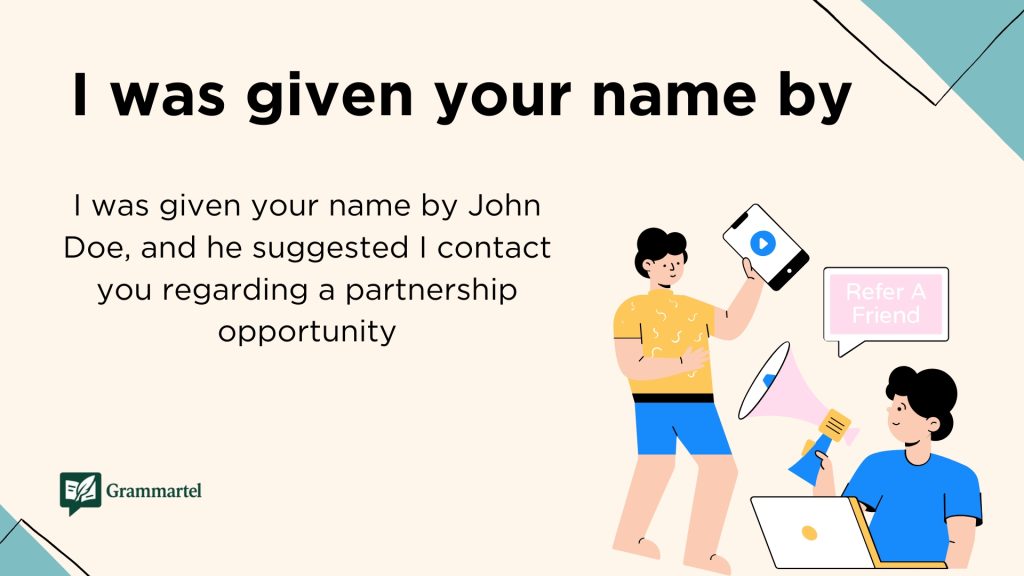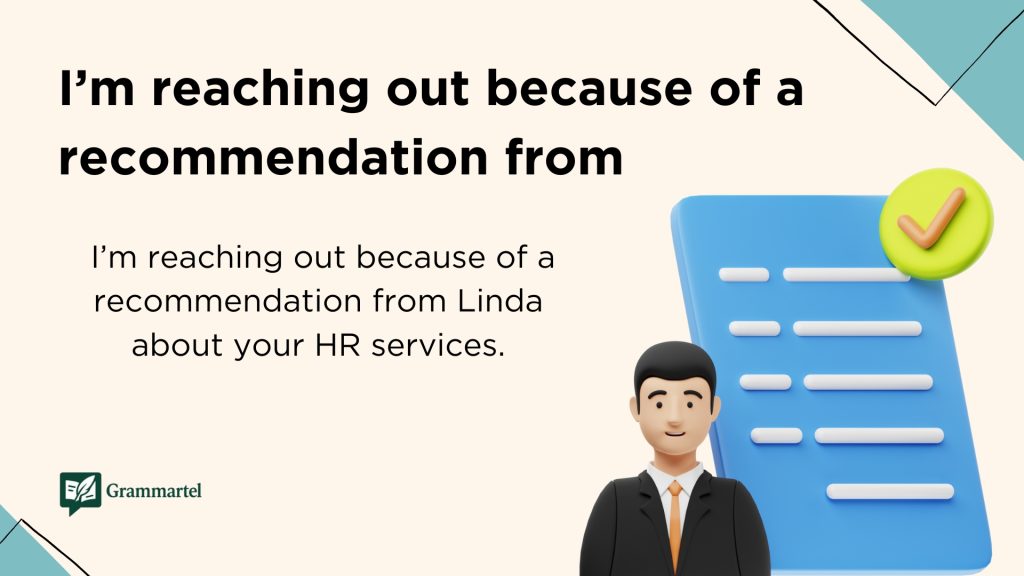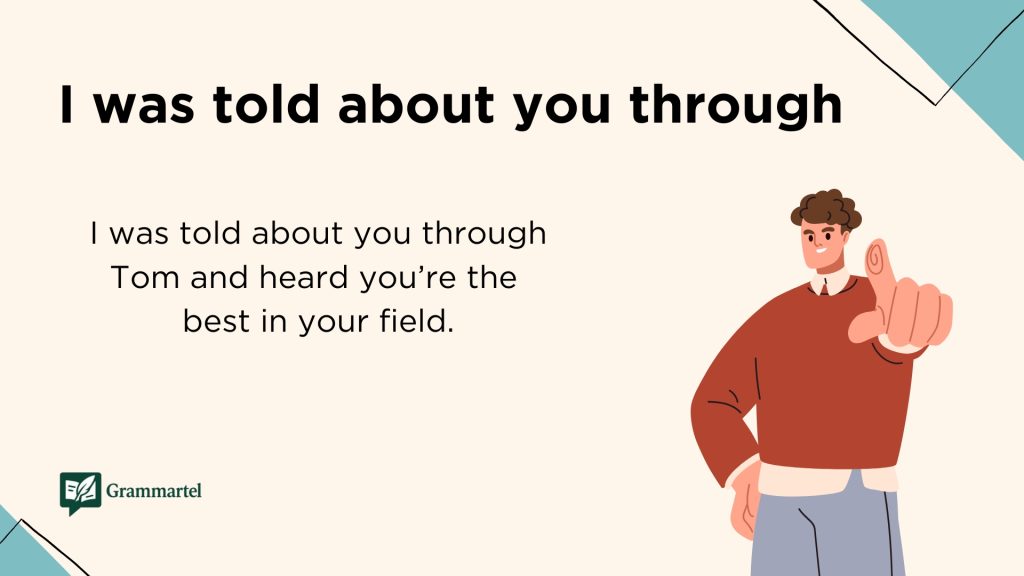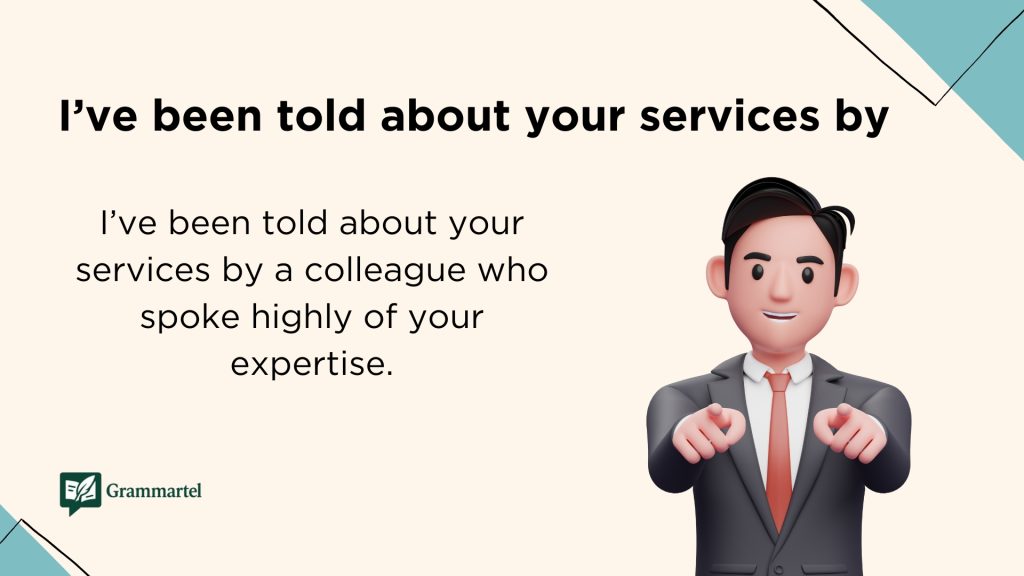When reaching out to someone for the first time, mentioning how you found them can help establish trust and context. One common phrase people use is “I was referred to you by,” but it can sound a bit too casual or overused. Luckily, there are many professional and polished ways to express this idea. In this article, we’ll explore 40 alternatives to saying “I was referred to you by,” with real-life examples to guide you in making a strong, professional impression.
What Does “I Was Referred to You By” Mean?
“I was referred to you by” is a phrase often used to mention that someone recommended you to a person or business. It indicates that you have a connection or introduction through a mutual contact. This can be useful in professional settings, where referrals help establish trust and credibility between people who haven’t met before.
When to Use “I Was Referred to You By”
Use “I was referred to you by” when you are reaching out to someone based on a recommendation. It’s a great way to introduce yourself and build rapport. This phrase works well in emails or conversations, especially when networking, job hunting, or seeking advice. It helps create a sense of familiarity and often opens doors for better communication.
40 Professional Ways to Say “I Was Referred to You By”
1. I was given your name by

- Meaning: You were introduced to someone through a mutual contact.
- Explanation: You are informing the person that a mutual contact recommended you reach out to them.
- Example: I was given your name by John Doe, and he suggested I contact you regarding a partnership opportunity.
- Best Use: When you’re looking to establish a business or professional connection.
- Worst Use: When you’re trying to establish a personal connection without having a genuine referral.
- Tone: Professional and formal.
2. [Name] suggested I reach out to you
- Meaning: A person recommended you contact someone.
- Explanation: It’s a polite way to indicate a recommendation or suggestion for communication.
- Example: Sarah suggested I reach out to you about your marketing services.
- Best Use: When making a professional inquiry or request.
- Worst Use: If you don’t actually know the person well enough to use their name as a referral.
- Tone: Friendly and professional.
3. I was directed to you by
- Meaning: Someone sent you in the direction of this person.
- Explanation: This phrase indicates that you were guided or pointed to someone for assistance or information.
- Example: I was directed to you by Jane at the marketing agency.
- Best Use: When seeking help, advice, or information.
- Worst Use: When you’re unsure if the referral was direct or genuine.
- Tone: Neutral to professional.
4. I was introduced to you by
- Meaning: Someone made a formal introduction between you and the person.
- Explanation: This phrase indicates that an introduction has already been made, either personally or professionally.
- Example: I was introduced to you by Michael from HR. He mentioned you could assist with my project.
- Best Use: When referring to a formal introduction in a business setting.
- Worst Use: If the introduction wasn’t actually made or was informal.
- Tone: Formal.
5. [Name] recommended I contact you
- Meaning: Someone advised you to reach out to this person.
- Explanation: A direct suggestion to communicate with someone, typically for advice or a service.
- Example: Mark recommended I contact you about your consulting services.
- Best Use: When you are following up on a referral and need assistance or advice.
- Worst Use: If the person doesn’t actually know the referred contact well enough.
- Tone: Polite and respectful.
6. I got your contact from [Name]
- Meaning: A person provided you with the contact details.
- Explanation: You received the person’s information via someone else.
- Example: I got your contact from Susan, and she mentioned you could help with the event planning.
- Best Use: When you’re following up after receiving someone’s contact information.
- Worst Use: If you’re unsure whether the person gave their contact willingly.
- Tone: Casual to professional.
7. I was told you could help with
- Meaning: Someone informed you that the person you’re contacting can provide assistance.
- Explanation: You’re reaching out because someone indicated that this person could be helpful.
- Example: I was told you could help with finding a vendor for our upcoming event.
- Best Use: When asking for specific help or advice.
- Worst Use: If you’re not sure if the information you received is accurate.
- Tone: Neutral.
Also Read : 40 Professional Ways to Say “Thank You for Your Flexibility” (With Examples).
8. A mutual acquaintance suggested I get in touch
- Meaning: Someone you both know suggested you contact them.
- Explanation: This implies a mutual connection made the suggestion.
- Example: A mutual acquaintance suggested I get in touch regarding your project management services.
- Best Use: When making a polite approach for business or networking.
- Worst Use: If the connection isn’t genuine or if you’re not comfortable with the mutual acquaintance.
- Tone: Polite and professional.
9. [Name] asked me to reach out to you
- Meaning: Someone specifically instructed you to contact this person.
- Explanation: You were told directly by another person to make contact.
- Example: Sarah asked me to reach out to you about the opportunity at your company.
- Best Use: When following up on a clear request.
- Worst Use: If you haven’t actually received this request or aren’t sure of the instructions.
- Tone: Respectful and direct.
10. I heard about you from [Name]
- Meaning: You learned of the person through someone else.
- Explanation: A simple way to say you were introduced indirectly through word of mouth.
- Example: I heard about you from Greg, who mentioned your expertise in business development.
- Best Use: When introducing yourself in a casual networking situation.
- Worst Use: If you haven’t heard of the person in a credible way.
- Tone: Informal but respectful.
11. I was put in touch with you by
- Meaning: Someone made an effort to connect you with this person.
- Explanation: This phrase suggests a purposeful connection was made by another person.
- Example: I was put in touch with you by Anne, who spoke highly of your expertise in graphic design.
- Best Use: When following up after a referral through a trusted connection.
- Worst Use: If the connection wasn’t made directly or wasn’t genuine.
- Tone: Professional and respectful.
12. [Name] gave me your details
- Meaning: Someone provided you with the person’s contact information.
- Explanation: This phrase can be used when you’re reaching out after receiving contact details.
- Example: John gave me your details, and he suggested you might be able to help with my software development needs.
- Best Use: When following up on a referral with clear details.
- Worst Use: If the details weren’t given or weren’t relevant.
- Tone: Casual to neutral.
13. I was referred by
- Meaning: Someone officially referred you to this person.
- Explanation: This is a more formal way to indicate that you were pointed to someone by a specific person.
- Example: I was referred by Tom to inquire about your legal services.
- Best Use: When initiating formal business communication.
- Worst Use: If the referral wasn’t explicit or official.
- Tone: Formal.
14. [Name] mentioned you might be able to assist with
- Meaning: You were told that this person could help you with something.
- Explanation: A suggestion was made to contact the person for assistance.
- Example: Mike mentioned you might be able to assist with marketing strategy for our startup.
- Best Use: When making a professional request based on a referral.
- Worst Use: If you’re not sure about the referral.
- Tone: Professional and polite.
15. I’m reaching out because of a recommendation from

- Meaning: You are contacting someone based on someone else’s suggestion or referral.
- Explanation: This phrase indicates that the reason for reaching out is due to a recommendation.
- Example: I’m reaching out because of a recommendation from Linda about your HR services.
- Best Use: When following up on a recommendation for business.
- Worst Use: If the recommendation isn’t clear or trustworthy.
- Tone: Respectful and formal.
16. I was told you were the best person to talk to about
- Meaning: Someone suggested that this person is the right contact for your query.
- Explanation: You are reaching out because you’ve been told this person is the expert or the go-to person.
- Example: I was told you were the best person to talk to about digital marketing for startups.
- Best Use: When you need specific expertise.
- Worst Use: If you’re uncertain about the person’s credentials.
- Tone: Professional.
17. I’m contacting you on the recommendation of
- Meaning: You are reaching out to someone because they were recommended by another person.
- Explanation: This phrase is used to introduce the referral as the reason for your outreach.
- Example: I’m contacting you on the recommendation of Jane, who mentioned you could help with our branding.
- Best Use: When following up on a specific recommendation.
- Worst Use: If the recommendation wasn’t clear.
- Tone: Professional and courteous.
18. I was told to get in touch with you by
- Meaning: You were instructed by someone to contact this person.
- Explanation: This indicates that someone specifically advised you to reach out.
- Example: I was told to get in touch with you by Emily about your website design services.
- Best Use: When the connection is formal and clear.
- Worst Use: If the advice wasn’t specific or relevant.
- Tone: Direct but polite.
19. A friend recommended I contact you
- Meaning: A friend suggested you reach out to this person.
- Explanation: The referral is from a personal connection, which makes it informal.
- Example: A friend recommended I contact you about your photography services.
- Best Use: When the relationship is friendly and personal.
- Worst Use: If the friend isn’t trustworthy or doesn’t know the person well.
- Tone: Friendly.
20. I was put in contact with you through
- Meaning: Someone facilitated your connection with the person.
- Explanation: A person or organization helped make the introduction.
- Example: I was put in contact with you through our mutual acquaintance, Jack.
- Best Use: When explaining how you got their information or were introduced.
- Worst Use: If the contact wasn’t initiated properly or through a credible source.
- Tone: Formal.
21. I was given a referral to you from
- Meaning: Someone referred you to this person for help or services.
- Explanation: This indicates you’ve received a direct referral.
- Example: I was given a referral to you from Sarah for your legal expertise.
- Best Use: When you need specific help based on a referral.
- Worst Use: If the referral is unclear or doesn’t seem authentic.
- Tone: Professional.
22. I heard you were highly recommended by
- Meaning: You were told that this person comes highly recommended by someone you trust.
- Explanation: This conveys trust in the recommendation.
- Example: I heard you were highly recommended by John for your design work.
- Best Use: When seeking a trusted referral.
- Worst Use: If the recommendation isn’t genuine or you aren’t sure of its credibility.
- Tone: Professional.
23. I was told you’re the go-to person for
- Meaning: Someone indicated that this person is the best option for your needs.
- Explanation: The person you’re contacting is recommended as the best fit for your requirements.
- Example: I was told you’re the go-to person for advice on business development strategies.
- Best Use: When you’re looking for the best expert.
- Worst Use: If you don’t know if the person is actually qualified.
- Tone: Respectful.
24. I’ve been advised to contact you
- Meaning: Someone suggested that you reach out to this person.
- Explanation: It’s a way of mentioning that someone recommended you get in touch.
- Example: I’ve been advised to contact you by my colleague at work regarding a partnership opportunity.
- Best Use: When you need to show that you’ve followed someone’s advice.
- Worst Use: If you don’t actually have the advice or don’t know the person who advised you.
- Tone: Professional.
25. A colleague recommended that I reach out to you
- Meaning: A coworker suggested that you contact this person.
- Explanation: A colleague in your professional network pointed you in this person’s direction.
- Example: A colleague recommended that I reach out to you about your services.
- Best Use: In a professional context when the colleague is trusted.
- Worst Use: If the recommendation isn’t solid or the colleague isn’t reliable.
- Tone: Formal.
26. I was told you specialize in
- Meaning: Someone informed you that this person is an expert in a specific field.
- Explanation: You’re reaching out because the person is an expert in something you need.
- Example: I was told you specialize in digital marketing and could help us with SEO.
- Best Use: When seeking expertise.
- Worst Use: If you’re not sure the person has the right qualifications.
- Tone: Neutral.
27. I’ve been given your details by
- Meaning: Someone passed along this person’s contact information to you.
- Explanation: You received the contact through a referral or recommendation.
- Example: I’ve been given your details by Maria to discuss your photography services.
- Best Use: When you are inquiring about a service after receiving contact details.
- Worst Use: If the details were given without clear permission.
- Tone: Casual.
28. [Name] suggested you would be the best person to talk to about
- Meaning: Someone recommended this person for a specific topic.
- Explanation: The phrase suggests that the person is the most qualified to address your needs.
- Example: Jane suggested you would be the best person to talk to about business development.
- Best Use: When approaching an expert for guidance.
- Worst Use: If you’re not certain the person is the best fit.
- Tone: Polite.
29. I was told about you through

- Meaning: Someone told you about this person.
- Explanation: This is a more general way of saying you heard about someone from a third party.
- Example: I was told about you through Tom and heard you’re the best in your field.
- Best Use: When you don’t need to go into details about the connection.
- Worst Use: If the connection isn’t solid or credible.
- Tone: Neutral.
30. I’ve been put in touch with you by
- Meaning: Someone made sure you had contact with this person.
- Explanation: This implies the contact was facilitated by a third party.
- Example: I’ve been put in touch with you by David, who mentioned your services.
- Best Use: When following up on a facilitated introduction.
- Worst Use: If the introduction wasn’t genuine.
- Tone: Formal.
31. A friend mentioned you could assist with
- Meaning: A friend referred this person to you as someone who can help.
- Explanation: You are contacting someone on a friend’s suggestion.
- Example: A friend mentioned you could assist with some software development questions.
- Best Use: When looking for help based on a friend’s recommendation.
- Worst Use: If you’re not close with the friend or the person doesn’t specialize in what you need.
- Tone: Friendly.
32. A colleague suggested I contact you
- Meaning: A professional coworker advised that you reach out to this person.
- Explanation: You’re being polite and formal in explaining the referral.
- Example: A colleague suggested I contact you about your expertise in financial planning.
- Best Use: When you are following up after receiving a professional referral.
- Worst Use: If the colleague doesn’t know the person well enough.
- Tone: Formal.
33. I was referred to you through [Name]
- Meaning: A mutual connection referred you to this person.
- Explanation: You are contacting someone through a mutual connection.
- Example: I was referred to you through Alex to discuss potential collaboration.
- Best Use: When following up on a referral.
- Worst Use: If the referral isn’t clear or the mutual connection is not well-known.
- Tone: Professional.
34. I’ve been given your name through
- Meaning: Someone passed along this person’s name to you.
- Explanation: You received the person’s contact information from someone else.
- Example: I’ve been given your name through Laura to discuss graphic design opportunities.
- Best Use: When reaching out after receiving someone’s contact info.
- Worst Use: If you don’t have a clear reason to contact them.
- Tone: Neutral.
35. I was informed you might be able to help with
- Meaning: Someone told you that this person could provide assistance.
- Explanation: A referral to a person based on their ability to help with something.
- Example: I was informed you might be able to help with tax consulting.
- Best Use: When asking for help from an expert.
- Worst Use: If the person is unclear on how they can help.
- Tone: Formal.
36. I was recommended to speak with you
- Meaning: Someone specifically recommended you speak with this person.
- Explanation: You’re reaching out because of a person’s direct recommendation.
- Example: I was recommended to speak with you about your leadership development services.
- Best Use: When the recommendation is strong and credible.
- Worst Use: If the recommendation isn’t from a trusted source.
- Tone: Respectful.
Check this out : 40 Best Ways to Say “Nice to Connect With You” (With Examples).
37. I’ve been encouraged to reach out to you by
- Meaning: Someone motivated you to contact this person.
- Explanation: The person you’re contacting was suggested as a good resource for help.
- Example: I’ve been encouraged to reach out to you by Jennifer regarding your expertise in data analytics.
- Best Use: When seeking advice or collaboration based on someone’s encouragement.
- Worst Use: If the encouragement doesn’t come from a reliable source.
- Tone: Friendly to neutral.
38. I’ve been told you’re the right person for
- Meaning: You’ve been informed that this person is the best contact for a specific matter.
- Explanation: This is an indirect reference to the person’s qualifications or expertise.
- Example: I’ve been told you’re the right person for advice on digital transformation.
- Best Use: When seeking expert advice.
- Worst Use: If the recommendation isn’t credible.
- Tone: Professional.
39. A mutual friend suggested I reach out to you
- Meaning: A friend known to both of you suggested making contact.
- Explanation: This conveys that a common friend made the recommendation.
- Example: A mutual friend suggested I reach out to you about marketing opportunities.
- Best Use: When following up on a friend’s recommendation.
- Worst Use: If the friend’s recommendation is unclear or untrustworthy.
- Tone: Casual.
40. I’ve been told about your services by

- Meaning: Someone referred you to this person’s services.
- Explanation: This phrase indicates that you were recommended to this person based on their services.
- Example: I’ve been told about your services by a colleague who spoke highly of your expertise.
- Best Use: When looking to establish professional contact based on positive feedback.
- Worst Use: If the services were not properly described or the referral is unclear.
- Tone: Formal.
Conclusion
In conclusion, using varied and polished phrases to introduce how you were referred can make your message sound more professional and respectful. These alternatives help establish credibility and show that you value the person’s time.
Keep your learning mode on with Grammartel.

